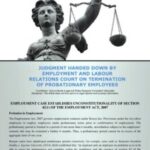The promulgation of the Constitution of Kenya 2010 culminated in the complete overhaul of Kenya’s land regime leading to the enactment of the 2012 Land Laws including the Land Act, the Land Registration Act and the National Land Commission Act. The latest addition to Kenya’s land regime comes more than eight years later with the repeal of the Sectional Properties Act 1987 which on 28 December 2020 was replaced by the Sectional Properties Act 2020 to bring it into alignment with the provisions of Kenya’s 2010 dispensation. The new Act modernizes many of the provisions of the 1987 Act in addition to some substantive changes with various implications for sectional properties in Kenya.
RESIDUE TERM
The Sectional Properties Act 1987 (now repealed) applied to leasehold properties with unexpired residue terms of not less than 45 years. Under the provisions of the Sectional Properties Act 2020 this term is now 21 years.
CERTIFICATE OF TITLE OR CERTIFICATE OF LEASE
The provisions of the old Act provided for the issuance of title deeds for sectional properties with respect to each unit. The new Sectional Properties Act now makes provision for the issuance of a certificate of title or certificate of lease. Additionally, the title is now to include the unit’s proportional share in the common property.
CONVERSION TO UNITS
Long-term sub-leases conferring ownership of apartments, flats, maisonettes, townhouses or offices registered before 28 December 2020 must conform to Section 54(5) of the Land Registration Act within a period of two years. Such conversion may be initiated by a developer, a management company or an owner of a unit. If the conversion is not effected within the prescribed period, the Registrar shall register a restriction against the title to prevent any further dealings on it by the proprietor or developer.
INSTITUTIONAL MANAGER
The Sectional Properties Act 1987 mandated the appointment of an institutional manager to manage the units, the common property and both the moveable and immoveable property of a Corporation. Under the new Act however, the Corporation may ensure the property is well managed including through the engagement of the services of a property manager. The powers and duties of the Corporation subject to any restriction, are performed by the board of the corporation.
DISPOSITION OF COMMON PROPERTY AND EXCLUSIVE USE AREAS
The previous Act allowed the disposition of common property or any part of it either through a transfer or lease agreement. The provisions of the new Sectional Properties Act however prohibit Corporations from making by-laws that permit material changes in the use or density of the common property without the prior approval of the relevant county government. Such by-laws have no force or effect. Additionally, subject to a unanimous resolution, if permitted by its by-laws, a Corporation may grant a lease to an owner of a unit for the exclusive use of an area or areas of the common property.
TERMINATION AND DISSOLUTION OF CORPORATIONS
Under the old Act, the sectional status could be terminated by unanimous resolution. Additionally there was a requirement for an application to be made to the court by the Corporation, owner of a unit, a registered chargee or a purchaser under an agreement for sale. This requirement has been done away with under the Sectional Properties Act 2020. In addition to unanimous resolution, the sectional status of building may also be terminated by substantial or total damage to the building or by compulsory acquisition under the provisions of the new Act. The effect of termination of the sectional property status is the automatic dissolution of the Corporation.
LIMIT ON SECURITY DEPOSIT
The 1987 Act provided that the amount the developer may charge the purchaser as a security deposit in respect of the unit was not to exceed one month’s rent. The new Act does not contain any such caps meaning that a developer is at liberty to charge a security deposit if a purchaser opts to rent a unit prior to receiving the title.
GEO-REFERENCING OF SECTIONAL PLANS
Every plan lodged for registration as a sectional plan under the provisions of the new Act is to be geo-referenced. In addition, the new Act permits the use of technology by Corporations in the execution of their duties.
CAUTIONS IN RESPECT OF UNPAID AMOUNTS
Corporations may register cautions against the title to an owner’s unit for any amount that may be due or unpaid, provided that the caution will be withdrawn within 30 days of payment. Notably, the repealed Act was silent on the period within which the caution should be withdrawn.
INVESTMENTS
The provisions of the new Act mandate a Corporation seeking to invest funds not immediately required by it to obtain an endorsement through a special resolution.
INTERNAL DISPUTE RESOLUTION COMMITTEE
The repealed Act required that certain disputes be resolved by the Landlord and Tenant Disputes Tribunal established under the Landlord and Tenant (Shops, Hotels and Catering Establishments) Act. Under the new Act, disputes relating to contravention of by-laws are referred to an internal dispute resolution committee. The Committee may hear and determine disputes without any limits as to the penalties to be levied. APPEALS The Sectional Properties Act 1987 barred any right of appeal from a ruling of the tribunal except on matters of law. The provisions of the 2020 Act however makes provision for appeals of decisions of the Internal Dispute Resolution Committee to the Environment and Land Court.
CONCLUSION
A recent notice issued on 9th May 2021 by the Ministry of Lands notified the public that longterm leases prepared on the basis of architectural plans will no longer be registered with effect from 10th May 2021 and further that the Lands Registry shall no longer register long-term leases for units. This runs contrary to the provisions of Section 54(5) of the Land Registration Act which mandates the Registrar to register long-term leases and to issue certificate of leases over units. The current law and procedures for transition remain unclear given that regulations and guidelines are yet to be finalized and that the Land Registration Act has not been amended where long-term leases are concerned. We will publish any further updates.





